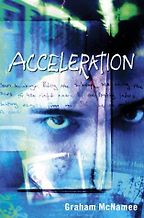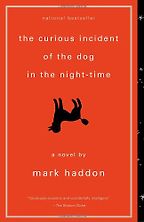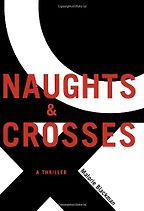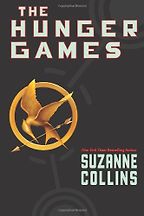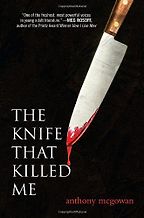You’ve chosen books for a reluctant reader. Were you a reluctant reader?
It wasn’t me that was a reluctant reader. This is one of those stories I’ve told loads of times. It’s what set me off on writing the first CHERUB book. My nephew Jarred was about 12 or 13 and I was out in Australia with him. He’d always been a reader when he was younger and he’d just sort of got into this, ‘It’s all rubbish. I’m not interested in books any more. I’m not interested in reading.’ And I targeted CHERUB at him really – boys of a certain age who’ve grown beyond the Harry Potter thing. I just thought that that’s where I’m at and what my books are good for, so I thought it would be good to choose other books here that would appeal to that same kind of audience – my core audience.
My son is one of your core audience.
It’s so nice, that. So often you set off to do something in life and you don’t achieve it.
You’re telling me.
I was targeting a particular audience and I never really wanted to be a writer. Millions of people churn out books. Most of them don’t sell that well and it was just a light-bulb moment where I thought: ‘Here is an audience that doesn’t seem to be particularly well catered for, so let’s have a go at that.’ My readership is quite broad but I still regard those boys between ten and 14 as the core of my audience and I don’t ever want to move away from that because they are the backbone, the cornerstone.
Tell me about Acceleration.
The first time I went into my publisher’s office I saw this book with a fantastic cover – Graham McNamee is quite famous in Canada and he writes these fantastic books. He’s a total recluse and he doesn’t do any publicity or any marketing and he only writes a book about every four years and his books are really good. Acceleration was the first one I read. See what you think. I was awed by it and thought it was the sort of thing I could do and it appeals to my kind of audience. He wrote another book called Bonechiller a couple of years later, but he’s just really, really obscure. When you compare Bonechiller to all the other vampire books around at the moment, this is so much better.
What’s Acceleration about?
It’s about a kid who gets a summer job in a lost and found department in a metro station somewhere in Canada. I think it’s Toronto but I might be wrong. It’s very dark and creepy. Basically what he does is he finds something in the lost and found, this German logbook or whatever, that he thinks is related to a murder and he starts to investigate it. It’s very atmospheric with lots of dank tunnels and it’s a really well written book. It’s a real shame because it should be huge. It’s an absolutely brilliant book and I just loved it to bits.
The Curious Incident of the Dog in the Night-Time. This crosses over into being an adult book as well, doesn’t it?
It does, and what’s really funny is that he wrote this spy series for eight- or nine-year-olds and then he suddenly comes out with this rather brilliant novel. It’s so wide open. Is it an adult book? Is it a kids’ book? So many people can read it and approach it.
My favourite story about it is that I went to a library at a very posh public school in Cambridge, and the librarian had a secret cupboard at the back of her library where she kept books that she only gave to her most trusted readers, and The Curious Incident of the Dog in the Night-Time was in there. The governors of the school were such prudes, they wouldn’t let the kids read anything. I said to her: ‘What happens if they find out. Won’t you get the sack?’
Five Books interviews are expensive to produce. If you're enjoying this interview, please support us by donating a small amount.
‘Well,’ she said, ‘my husband’s quite well off and I retire in a couple of years anyway. I don’t care, they’re just a bunch of prudes.’ I expect she’s fully retired now, but that’s the kind of reaction that book inspires, I think.
I think it might be quite hard for an 11- or 12-year-old to read. Aren’t there pages of maths in it?
Well, h’m, I don’t remember that. But when you’re thinking about reluctant readers then, no, it’s not going to appeal to the same reluctant reader who’s going to pick up a CHERUB book or the Anthony McGowan or Acceleration. It’s a slightly higher-brow book, slightly different, but kids are different too. Maybe your son wouldn’t enjoy it now, but a slightly quirky 14-year-old girl would absolutely love it. I just think there’s not a prescription for a certain type of kid.
Tell me about Noughts and Crosses (which becomes Naughts and Crosses in the US).
This is just one of those books. So well written, and all her books are good but this one is so much better than all the others. I just remember picking it up and I was a little bit put off. I thought it was going to be a politically correct thing about black and white people and stuff like that. It sat on the shelf for a long time and then I picked it up when I was bored and I sat and read the book all the way through. You pick it up at half three in the afternoon and at half 11 at night you’re lying in bed reading the final chapter. It gripped me all the way through.
What’s it about?
It’s hard to describe. It’s set in a society where it’s a reverse South Africa and the blacks are quite dominant and the white people are slaves, and then you’ve got these star-crossed lovers, a black girl and a white boy… It all sounds quite corny but it’s one of those books. It’s more of a thriller than anything else. I reckon if you could get your son to start reading it – OK, it’s written by a lady and it’s a romance – but if you could get him to start reading it, I reckon he’d love it.
I’ll give it a go. The Hunger Games.
It’s been hyped as the next big thing. They’re making a movie; it’s selling massive numbers of copies in America, and that’s how I came to it. As a commercially minded author I always look at what they’re doing and why they’re successful and I’m very often quite disappointed. In a way this is a more action-based version of Noughts and Crosses. A boy and a girl love each other and it’s kind of sci-fi. They get sucked out of their village to go and fight in this game and the only survivor wins. It’s quite brutal with all these kids killing each other and genetically engineered wasps that chase you around. It’s very exciting. I really loved it.
You say that you look at big-selling authors to see what’s working. Is there something that unifies them? Is there something you are all doing that’s the same?
No. I wish I knew what that certain something was. There are some common things. They’re always a series, which is one of the reasons I made CHERUB a series, just because even at four or five you tell kids a story and they look up and they go: ‘What happens next?’ Kids really engage with characters so the series thing is important, though there are millions of series out there that aren’t selling well, of course. Adults and children are different. Kids have long periods where they haven’t got much to do. They’re not always fully occupied. They will read all the CHERUB books straight through or they will sit and read them again and again. If kids fall in love with something they really obsess over it and read the whole series and then read it again. I think that’s different with adults. I like the John Updike Rabbit books and I read them a long time ago and would quite like to read them again, but it’s just the commitment of time to read them. Kids just really respond to a series. They really engage and believe in the characters and they want to know what happens next.
Tell me about the Anthony McGowan, The Knife that Killed Me.
I just picked this one up because it got a lot of critical attention and was up for various prizes, though I don’t think it sold particularly well. It seemed like he’d written something quite special this time. It’s just a very urban, gritty book about a kid in quite a grimy school who’s getting bullied and there’s knife crime going on. It all sounds a bit dreary and stereotypical but he’s actually done it in a really nice way and there’s a big twist at the end. I wouldn’t want to spoil the twist, not least because I can’t actually remember what the twist is. It’s square on the CHERUB audience. There’s a bit where the bully punches someone and then pees on him and it made me laugh so much that I put it in a CHERUB book.
You see, as a parent reading these CHERUB books I find them quite shocking and part of me wishes my son wouldn’t read this stuff. Certainly there’s one of yours with a very sexual S&M scene and I really didn’t like it. Do you think these books have that in common too? That your parents don’t really want you to be reading it?
I definitely think that parents get paranoid because, with books, a child from the age of about eight or nine enters into a world that as a parent you’re not familiar with. Once they get to that age you can’t read every book they read. Whereas if they’re in their room watching a movie you can sort of peek, and anyway you’ve probably bought the DVD or the game yourself. But books are the first things they escape into that you don’t have control over.
Sign up here for our newsletter featuring the best children’s
and young adult books, as recommended by authors, teachers, librarians and,
of course, kids.
I think there is some kind of strength in that, but I don’t like the idea that I’m particularly sensationalist. I always say it’s the EastEnders test. Broadly speaking nothing happens in my books that doesn’t happen in EastEnders. It’s not quite true because the sexual content in my books is a bit lower and the violence is a bit more, but that’s more to do with the genre, because you’re comparing a soap opera to a thriller. Partly, you get a bum rap as an author because parents think your books are going to be nice and cosy but that’s not necessarily the case. You have to push boundaries a bit to write books that kids actually find exciting.
Also, I haven’t read them. My son is telling me about them and he thinks they’re all edgy because it’s a world he’s in by himself.
I’ve got an anecdote! The lady who runs the kids’ section of the Cheltenham books festival has a son who’s 12 and she said: ‘I first found out about your books when my son was sitting in the corner of the living room engrossed in a book and he suddenly looked up and asked me what an orgy was.’ It’s not an orgy scene in the book. It’s a joke someone makes. I remember writing it and wondering if I can put a reference to an orgy in the book. I don’t know if you’ve read Asterix books, but there’s one of those, I think it’s Asterix in Switzerland, where they’re always having orgies, though there’s nothing explicitly sexual in the drawings. I sort of thought that if they can get away with it in Asterix then I can put it in a book. That was my out.
None of these books is cosy, so perhaps that is what unites them?
I think when you’ve got a reluctant reader you’ve got to tickle something inside them, tell them this is a bit naughty, a bit dangerous, a bit adventurous. I bet whatever movies your son watches, he may guiltily enjoy Disney movies, but it’s probably something like Terminator or Avatar or something that he’s going to watch with his mates. Something a bit violent and in your face.
February 11, 2011. Updated: September 16, 2023
Five Books aims to keep its book recommendations and interviews up to date. If you are the interviewee and would like to update your choice of books (or even just what you say about them) please email us at [email protected]
